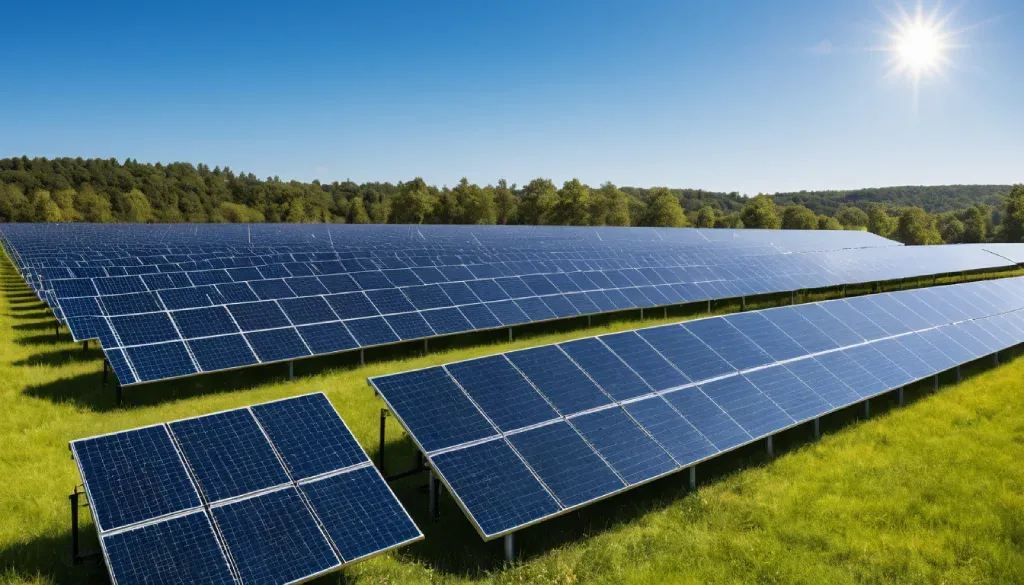Discover the benefits of solar energy to the environment and learn how solar power reduces emissions, pollution, and dependency on fossil fuels while supporting a sustainable future. The environmental impact of human energy consumption is undeniable, and the transition to renewable energy sources has become essential for a sustainable future. Among the renewable energy sources, solar energy stands out as a powerful and eco-friendly option. But what are the benefits of solar energy to the environment, and why should we consider switching to it? Benefits of Solar Energy to the Environment Solar energy offers numerous environmental benefits, from reducing greenhouse gases to conserving natural habitats. Let’s explore each in detail. 1. Reduces Greenhouse Gas Emissions Solar energy is a clean and green source of power. Unlike fossil fuels, solar panels don’t emit harmful gases, contributing to a significant reduction in greenhouse gases. Carbon Dioxide Reduction: Switching to solar power can substantially reduce carbon dioxide emissions. Greenhouse Gas Impact: By replacing traditional power sources, solar energy helps mitigate global warming. 2. Decreases Air Pollution Air pollution is a major environmental concern linked to respiratory issues and ecosystem degradation. Solar energy, however, produces electricity without polluting the air. Impact on Health: Reduced air pollutants mean fewer health risks. Cleaner Air: Solar-powered systems reduce reliance on coal, oil, and natural gas, leading to cleaner air. 3. Conserves Water Resources Traditional energy sources consume large amounts of water for cooling and processing. Solar energy, in contrast, requires minimal water for operation, helping conserve this precious resource. Water Conservation: Unlike nuclear or coal plants, solar panels don’t need constant water cooling. Impact on Aquatic Life: Reduced water usage also benefits aquatic ecosystems. 4. Reduces Water Usage Water scarcity is a pressing issue worldwide, and energy production is one of the significant consumers of fresh water. Solar energy systems use minimal water, preserving vital water resources. Eco-Friendly Operations: Solar panels don’t require water for power generation. Supporting Water Conservation Efforts: Less water use supports global water conservation efforts. 5. Minimizes Habitat Destruction Energy production often involves land disruption, impacting wildlife and natural habitats. Solar panels can be installed in ways that don’t require large-scale habitat destruction. Protecting Biodiversity: Solar farms can coexist with natural habitats. Reduced Land Impact: Rooftop solar panels use existing infrastructure, minimizing land disruption. 6. Sustainable and Renewable Solar energy is both sustainable and renewable, unlike fossil fuels, which are finite. Solar power contributes to a long-term energy solution without depleting Earth’s resources. Inexhaustible Energy Source: The sun provides abundant, renewable energy. No Resource Depletion: Solar energy generation doesn’t involve resource extraction. 7. Reduces Dependence on Nonrenewable Resources Relying on fossil fuels not only strains the environment but also risks energy security. Solar energy helps reduce our dependence on these nonrenewable resources. Energy Security: Solar power promotes energy independence. Environmental Impact: Reduced fossil fuel reliance means lower environmental strain. 8. Supports Ecosystem Health Solar energy’s reduced emissions and pollution contribute to a healthier environment, supporting ecosystems that depend on clean air and water. Healthier Soil and Water: Less pollution results in healthier soil and waterways. Preserving Wildlife: Cleaner air and water benefit local flora and fauna. 9. Encourages Sustainable Development Solar energy aligns with sustainable development goals, promoting eco-friendly growth for future generations. Support for Green Economy: Solar energy contributes to the green economy. Long-Term Solutions: Sustainable energy ensures resources for future generations. 10. Reduces Financial and Ecological Costs of Energy Production By generating power from the sun, solar energy reduces both the financial and ecological costs of energy production, offering a clean, cost-effective alternative. Conclusion Switching to solar energy offers undeniable benefits for the environment. From cleaner air to water conservation and habitat preservation, solar power is a pivotal tool in the fight against climate change. For more insights on environmental sustainability, explore envirocarecentral.com, your trusted source for eco-friendly living. FAQ Q: How does solar energy impact water conservation? A: Solar energy uses minimal water, conserving vital water resources compared to traditional energy production methods. Q: Why is solar energy considered a renewable resource? A: Solar energy relies on sunlight, an inexhaustible resource, making it sustainable and renewable for long-term use. Q: How does solar power reduce greenhouse gas emissions? A: Solar panels generate power without emitting greenhouse gases, cutting down pollution associated with traditional energy. Q: Can solar panels help preserve wildlife habitats? A: Yes, solar installations, especially rooftop systems, reduce the need for land clearing, thus protecting natural habitats.






